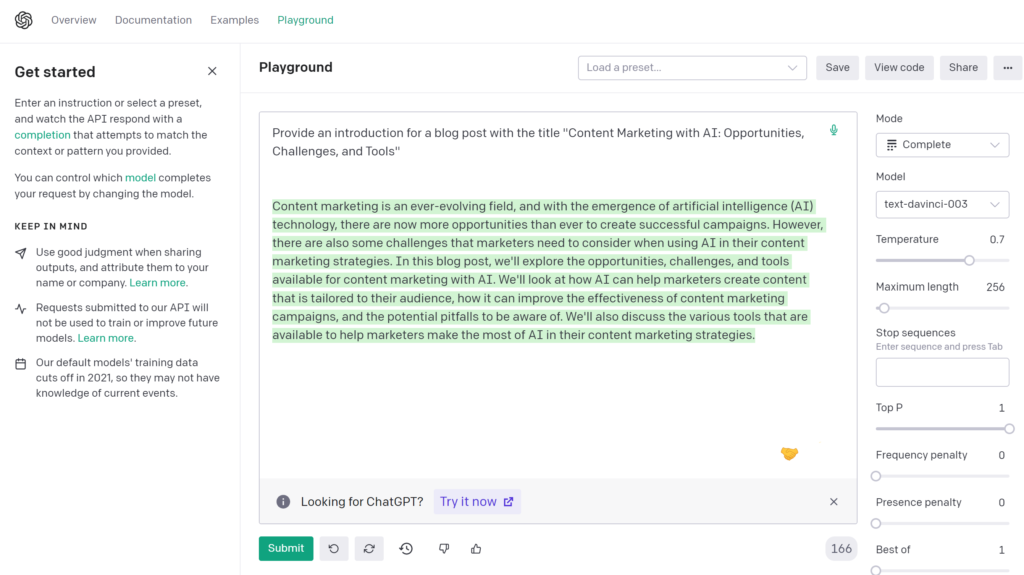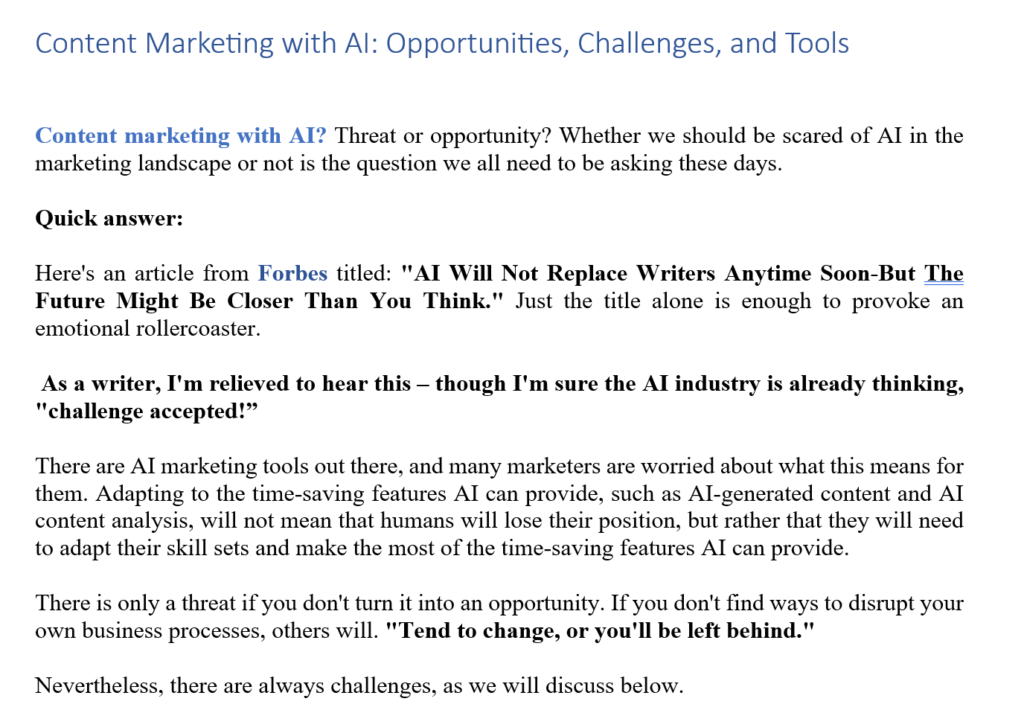
Table of Contents
Content marketing with AI? Threat or opportunity? Whether we should be scared of AI in the marketing landscape or not is the question we all need to be asking these days.
Quick answer:
Here’s an article from Forbes titled: “AI Will Not Replace Writers Anytime Soon-But The Future Might Be Closer Than You Think.” Just the title alone is enough to provoke an emotional rollercoaster.
As a writer, I’m relieved to hear this – though I’m sure the AI industry is already thinking, “challenge accepted!”
There are AI marketing tools out there, and many marketers are worried about what this means for them. Adapting to the time-saving features AI can provide, such as AI-generated content and AI content analysis, will not mean that humans will lose their position, but rather that they will need to adapt their skill sets and make the most of the time-saving features AI can provide.
There is only a threat if you don’t turn it into an opportunity. If you don’t find ways to disrupt your own business processes, others will. “Tend to change, or you’ll be left behind.”
Nevertheless, there are always challenges, as we will discuss below.
We begin by discussing the effectiveness of AI in content marketing.
Content marketing with AI: Definitions and brief history
It has been around for decades and can be found in everything from play-by-play chess robots to self-driving cars. Artificial intelligence (AI) is where computers replace the brain with software that simulates human intelligence.
By automating specific tasks related to your business, AI can help you focus on what matters most, creating high-quality content that engages your audience and drives sales.
The Benefits of AI in Content Marketing
AI can help you to:
Increase efficiency:
Many previously human-intensive tasks can now be automated by artificial intelligence. This will free up your team members’ time to focus on more worthwhile things. By delegating mundane and time-consuming tasks to AI, your team members can spend more time on projects that have higher value and require more thought and creativity. This will help your team become more efficient and productive.
Provide more personalized content:
By analyzing customer data, artificial intelligence can predict their preferences and needs, allowing you to generate more relevant messaging (and improve engagement).
You can increase customer engagement by delivering personalized messages at just the right time–when they are most likely to act on them.
Content Marketing and AI: How Can They Help Each Other?
AI can help content marketing in three main ways:
Content generation:
AI can be used to generate new, engaging content that’s relevant to your audience. In particular, this is useful for companies lacking the time or resources to create original content.
Automated analysis:
When you use AI to analyze the performance of your existing content and compare it with identical or similar pieces on the market, you’ll get a clearer picture of how well each piece performs and what elements make them successful (or not). This information will allow you to improve future campaigns by focusing on those aspects that work best for your readership while eliminating those that don’t resonate with their interests or needs.
Automated segmentation:
You may want different types of messages directed toward various groups within your target audience–for example, millennials versus baby boomers–and this kind of segmentation is easy for human beings but difficult without some automatic tool like machine learning algorithms.
The Challenges of AI in Content Marketing
There are several challenges to implementing AI in content marketing. First, it’s important to note that AI is not a cure-all for every one of your content problems. While it can help you create better content, there will still be times when you need human input or creativity.
Secondly, while machine learning algorithms may be able to generate some ideas for you and improve upon them over time (like Google’s new machine learning-powered image search), they don’t have the same level of creativity as humans do–at least not yet! So while this technology has its place on the digital marketing landscape, it shouldn’t be relied upon too heavily if you want your company’s blog posts and other channels of content creation efforts to stand out crowd.
Last but not least, there is the issue of privacy surrounding AI technologies like the Photos feature. What happens if someone misuses this technology? How much control should we give up for companies like Facebook and Google Photos to access our personal information?
The Future of AI in Content Marketing
With AI’s continued evolution, we’ll see an improved ability for machines to understand context, which can then be used to provide more tailored experiences.
For example, if you’re reading an article about how AI is being used in content marketing and then click on another article about how AI is being used in healthcare–the machine should be able to recognize the similarity between these topics and recommend other stories based on what you’ve already read.
In addition to providing some exciting benefits, AI can inform us how our audience behaves online (and what they respond well to), where they spend their time (and where our efforts should be concentrated), how long people spend on different pages on our site/app, etc.
Best Practices for Implementing AI in Content Marketing
Take small steps:
Don’t try to implement AI across your entire organization all at once. Instead, start by testing a few use cases in one department or division of your business. Using existing tools saves time and money while giving you access to some of the benefits of an AI solution (like automated insights).
Leverage existing data:
Utilize existing data sources to feed your AI system. This will help you ensure accuracy and performance.
Keep Testing:
Always be testing and refining your AI system. Even small changes can have a big impact on performance.
Make adjustments based on results!
Whenever something doesn’t work as you expect, change it until it does (or give up and stop using it altogether).
Let’s putting human writing and artificial intelligence side by side
Human writing may emphasize a narrative structure with a clear introduction, body, and conclusion, while AI writing may be more formulaic and organized around keywords.
To illustrate the difference between human writing and AI writing, let’s write an introduction to this blog. The picture below will help you understand.
In response to my request, the chatbot wrote an introduction for the blog.

I wrote this introduction in Microsoft Word for this blog

Neither of these writings seemed lacking, but there are some things to consider when working with AI! I carefully incorporated emotions into my writing. Despite AI’s ability to create accurate and grammatically correct content, it often lacks an emotional touch. That’s why it’s essential to review AI-generated content and make sure it conveys the intended message.
A successful AI-driven marketing strategy requires human involvement from start to finish. Generally, this means an individual providing instructions (for instance, a ChatGPT query or an arrangement of steps for a Zapier workflow), and then examining the output of the AI’s efforts once completed. AI marketing tools should never be given full independence; although they can be allowed to take action without oversight, it is essential to evaluate and modify their operations regularly.
My next step is to introduce you to some artificial intelligence tools for content creation.
Tools for content marketing using artificial intelligence
Content marketers can use AI tools for content creation, optimization, personalization, and analysis with the assistance of software applications utilizing artificial intelligence. Many AI tools for content marketing can save marketers time, improve quality, increase relevance, and boost performance. Some examples include:
An AI-powered writing, SEO, and research assistant that helps you create content faster and smarter.
Grammarly:
An AI-based writing assistant that helps you fix errors and improve your writing style.
Automated Insights:
A software platform that uses natural language generation to turn data into unique pieces of writing.
MarketMuse:
An AI-driven assistant that helps you build content strategies based on data and insights.
BrightEdge:
An SEO and content performance marketing platform that uses AI to discover search intent, create optimized content, and measure results.
HubSpot:
Cloud-based inbound marketing software that uses AI to help you discover and validate content ideas, create and manage multi-language content, generate leads, and more.
PathFactory:
A content insight and activation platform that uses AI to serve relevant content recommendations to your prospects and customers.
Conversica:
An AI-powered intelligent assistant that helps you engage in personalized conversations with your leads through email or SMS.
Jasper:
An AI writing prompt generator that helps you create short-form emails, landing pages, blogs, and social media content.
Conclusion
Content Marketing with AI? It May Not Be a Matter of a Choice!
Content marketing can be improved with AI, but this tool shouldn’t be used in isolation; it should be combined with human knowledge and experience. Using AI effectively requires making data-driven decisions based on insights from your audience, competitors, and industry trends.
With this guide, you’re now equipped with everything you need to start using artificial intelligence in your content marketing strategy!